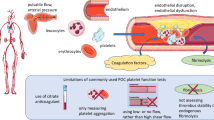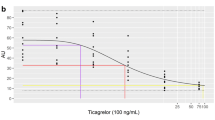Abstract
Anciximab provides potent, but variable degrees of platelet inhibition both during the duration of intravenous administration and at 12 hours following therapy. Platelet function was assessed using the PC-RPFA system in 78 patients scheduled for percutaneous coronary revascularization who were administered the standard abciximab weight-adjusted bolus and 12-hour infusion. The PC-RPFA system is a cartridge-based, semiautomated point-of-care whole-blood assay that incorporates fibrinogen-coated polystyrene beads, buffers, and a modified thrombin receptor activating peptide (Isotrap) in lyophilized form. The instrument detects the agglutination rate between the stimulated platelets and the fibrinogen-coated beads, and provides a quantitative digital display in less than 2 minutes. No differences in the level of platelet inhibition were observed in these abciximab-treated patients by diabetic status, gender, smoking, diagnosis (unstable angina, chronic stable angina, recent myocardial infarction), or abciximab treatment status (first time vs. retreatment). Nocorrelation of the PC-RPFA rate of platelet aggregation with clinical demographic factors was observed, with the exception of baseline hematocrit (r2 = 0.4556). The relationship between the PC-RPFA rate of aggregation and hematocrit reflects light absorbance by erythrocytes and is specific to the PC-RPFA system. The absolute rate of platelet aggregation (slope) reported by the PC-RPFA is correlated with percent aggregation, thus making it potentially possible to predict the level of aggregation without reference to a baseline (pretreatment) measure of platelet function. This correlation was closest for patients having <40% baseline aggregation (r2 = 0.55). Thus, PC-RPFA provides a rapid point-of-care assessment of platelet function that could allow for adjustment of abciximab dosing to achieve targeted levels of platelet inhibition. The utility of this device to optimize therapy with platelet glycoprotein IIb/IIIa inhibitors is currently being evaluated.
Similar content being viewed by others
References
The EPILOG investigators Platelet glycoprotein IIb/IIIa receptor blockade in low-dose heparin during percutaneous coronary revascularization. N Engl J Med 1997;336: 1689–1696.
Tcheng JE, Harrington RA, Kottke-Marchant K, et al. Multicenter, randomized, double-blind placebo controlled trial of the platelet integrin glycoprotein IIb/IIIa blocker integrilin in elective coronary intervention. Circulation 1995;91: 2151–2157.
A comparison of aspirin plus tirofiban with aspirin plus heparin for unstable angina. The Platelet Receptor Inhibition in Ischemic Syndrome Management (PRISM) Study investigators. N Engl J Med 1998;338:1498–1505.
Simpfendorfer C, Kottke-Marchant K, Lowrie M, et al. First chronic platelet glycoprotein IIb/IIIa integrin blockade; A randomized placebo-controlled pilot study of xemilofiban in unstable angina with percutaneous coronary interventions. Circulation 1997;96:76–81.
Kereiakes DJ, Kleiman N, Ferguson JJ, et al. Sustained platelet glycoprotein IIb/IIIa blockade with oral xemilofiban in 170 patients following coronary stent deployment. Circulation 1997;96:1117–1121.
Cannon CP, McCabe CH, Borzak S, et al. and the TIMI 12 investigators. A randomized trial of an oral glycoprotein IIb/IIIa antagonist, sibrafiban, in patients post and acute coronary syndrome: Results of the TIMI 12 trial. Circulation 1998;97:340–349.
Kereiakes DJ, Kleiman NS, Ferguson JJ, et al. Pharmacodynamic ef~cacy, clinical safety and outcomes following prolonged glycoprotein IIb/IIIa receptor blockade with oral xemilofiban: Results of a multi-center placebo controlled randomized trial. Circulation 1998;98:1268–1278.
EPIC Investigators. Use of a monoclonal antibody directed against the platelet glycoprotein IIb/IIIa receptor in high risk coronary angioplasty. N Engl J Med 1994;330:956–961.
Gold HK, Gimple L, Yasuda T, et al. Pharmacodynamic study of F(ab′)2 fragments of murine monoclonal antibody 7E3 directed against human platelet glycoprotein IIb/IIIa in patients with unstable angina pectoris. J Clin Invest 1990;86:651–659.
Coller BS, Scudder LE, Beer J, et al. Monoclonal antibodies to platelet GP IIb/IIIa as antithrombotic agents. Ann N Y Acad Sci 1991;614:193–213.
Smith, JW, Steinhubl SR, Lincoff AM, Coleman J, Li T, Hillman RS, Coller BS. The rapid platelet function assay (RPFA): An automated and quantitative cartridge-based method. Circulation, 1999;99:620–625.
Coller BS, Lang D, Scudder LE. A rapid and simple platelet function assay to assess GP IIb/IIIa receptor blockade. Circulation 1997;95:860–867.
Mascelli MA, Worley S, Veriabo NJ, et al. Rapid assessment of platelet function with a modified whole-blood aggregometer in percutaneous transluminal coronary angioplasty patients receiving anti GP IIb/IIIa therapy. Circulation 1997; 96:3860–3866.
Tcheng JE, Ellis SG, George BS, et al. Pharmacodynamics of chimeric glycoprotein IIb/IIIa integrin antibody FAB-73 in high risk coronary angioplasty. Circulation 1994;90: 1756–1764.
Simoons ML, de Boer MJ, van den Brand MJ, et al. For the European Cooperative Study Group. Randomized trial of a GP IIb/IIIa platelet receptor blocker in refractory unstable angina. Circulation 1994;89:596–603.
Steinhubl SR, Kottke-Marchant K, Rosenthal M, Moliterno DJ, Lincoff AM. Diabetics and nondiabetics achieve similar levels of platelet inhibition with abciximab therapy during and following percutaneous revascularization (abstr). Circulation 1998;98:8–767.
Mascelli MA, Lance ET, Damaraju L, Wagner CL, Weisman HF, Jordan RE. Pharmacodynamic profile of short term abciximab treatment demonstrates prolonged platelet inhibition with gradual recovery from GP IIb/IIIa receptor blockade. Circulation 1998;97:1680–1688.
Coller BS. Monitoring platelet GP IIb/IIIa antagonist therapy. Circulation 1998;97:5–9.
Catella-Lawson F, Kapoor S, Moretti DT, et al. Chronic oral glycoprotein IIb/IIIa antagonism in patients with unstable coronary syndromes: Reduced antiplatelet effect in comparison to patients with stable coronary artery disease (abstr). Circulation 1998;98: I–251.
Author information
Authors and Affiliations
Rights and permissions
About this article
Cite this article
Kereiakes, D.J., Mueller, M., Howard, W. et al. Efficacy of Abciximab Induced Platelet Blockade Using a Rapid Point of Care Assay. J Thromb Thrombolysis 7, 265–276 (1999). https://doi.org/10.1023/A:1008931126871
Issue Date:
DOI: https://doi.org/10.1023/A:1008931126871




